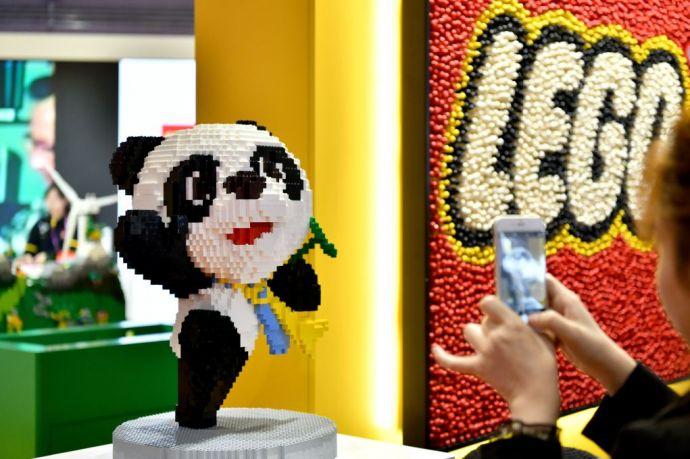
A visitor to the China International Import Expo takes a snapshot of Jinbao (the expo's mascot), which is built of Lego bricks. [Photo/Xinhua]
The masterpiece mosaic of 112,031 Lego bricks featuring Jinbao, the mascot of the China International Import Expo, at the Danish company's 378-square-meter booth at the Expo might alone has made it stand out as one of the most noticeable exhibits.
But it is with the exclusive launch of two sets of Spring Festival-themed products that the toymaker hopes to further penetrate into the country, one of its fastest growing markets, in which it has been selling its iconic bricks for 35 years.
"This is the first time we've made sets for a specific country or region," Niels B. Christiansen, chief executive officer of the Lego Group, said at the launch event during the CIIE in Shanghai.
"If you measure it by turnover, the United States is the biggest toy market in the world, as well as for Lego. But if you look forward, the potential, the opportunity and growth rates in China are amazing. So if you look at growth potential, China is the most important market," he added.
In March, the company reported its first sales decline in 13 years in its 2017 financial report. Its revenue fell by 7 percent from 37.9 billion Danish crowns ($5.77 billion) in 2016 to 35 billion Danish crowns. However, China continued to post double-digit growth, as the report showed, but failed to give a specific rate.
"We've been very happy with our development in China in the last three to four years, which has seen consistent double-digit growth," said Christiansen.
He added that the growth has been mainly driven by the increasing awareness built by the company, both online and offline.
To keep the momentum, he noted that the company will double its presence in China, by having 140 stores in more than 30 cities by the end of 2019, up from the current 47 stores in 16 cities.
It has also partnered with internet giant Tencent, China's biggest social network and gaming company, since the beginning of this year to develop online games and digital play experiences.
"With this collaboration, we had more than 600 million views and downloads of video material just this year. We're also set to come out with a video game with Tencent within the next coming months, which is going to be very exciting," he said.
Consultancy Euromonitor International estimated Lego has a share of around 3 percent of China's $31-billion toys and games market, followed by Mattel and Hasbro.
Looking ahead, the newly appointed executive, who took the helm of the family owned business in August 2017, sees a variety of opportunities in China, such as the second-child policy, the increasing importance attached to education, improving living standards, and the protection of intellectual property.
"Creating a business environment with more respect and protection for intellectual property is going to be very important. We can engage much more, with a higher safety level when intellectual property is better respected here," said Christiansen.
Source: China Daily




 A single purchase
A single purchase









